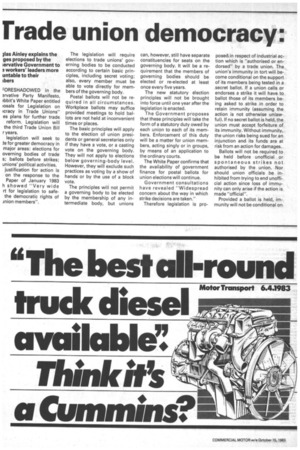Trade union democracy:
Page 36

If you've noticed an error in this article please click here to report it so we can fix it.
jlas Ainley explains the ges proposed by the ;ervative Government to a workers' leaders more untable to their ibers
=ORESHADOWED in the ..rvative Party Manifesto, bbit's White Paper entitled losals for Legislation on icracy in Trade Unions" es plans for further trade reform. Legislation will the third Trade Union Bill r years.
legislation will seek to ie for greater democracy in major areas: elections for overning bodies of trade s; ballots before strikes; unions' political activities. justification for action is on the response to the Paper of January 1983 h showed "Very wide rt for legislation to safethe democratic rights of in ion members". The legislation will require elections to trade unions' governing bodies to be conducted according to certain basic principles, including secret voting; also, every member must be able to vote directly for members of the governing body.
Postal ballots will not be required in all circumstances. Workplace ballots may suffice provided meetings to hold ballots are not held at inconvenient times or places.
The basic principles will apply to the election of union presidents or general secretaries only if they have a vote, or a casting vote on the governing body. They will not apply to elections below governing-body level. However, they will exclude such practices as voting by a show of hands or by the use of a block vote.
The principles will not permit a governing body to be elected by the membership of any intermediate body, but unions can, however, still have separate constituencies for seats on the governing body. It will be a requirement that the members of governing bodies should be elected or re-elected at least once every five years.
The new statutory election principles will not be brought into force until one year after the legislation is enacted.
The Government proposes that these principles will take the form of a statutory duty owed by each union to each of its members. Enforcement of this duty will be a matter for union members, acting singly or in groups, by means of an application to the ordinary courts.
The White Paper confirms that the availability of government finance for postal ballots for union elections will continue.
Government consultations have revealed "Widespread concern about the way in which strike decisions are taken."
Therefore legislation is pro posed, in respect of industrial action which is "authorised or endorsed" by a trade union. The union's immunity in tort will become conditional on the support of its members being tested in a secret ballot. If a union calls or endorses a strike it will have to ballot those of its members being asked to strike in order to retain immunity (assuming the action is not otherwise unlawful). If no secret ballot is held, the union must accept forfeiture of its immunity. Without immunity, the union risks being sued for an injunction and its funds are at risk from an action for damages.
Ballots will not be required to be held before unofficial or spontaneous strikes not authorised by the union. Nor should union officials be inhibited from trying to end unofficial action since loss of immunity can only arise if the action is made "official".
Provided a ballot is held, immunity will not be conditional on






















































































































